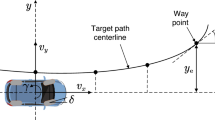
Overview
- Combines control and automotive expertise from an interdisciplinary standpoint
- Introduces a control-oriented modeling technology for nonlinear vehicle dynamics
- Provides valuable guidance for independent-driven vehicle design and further performance improvement
Part of the book series: Key Technologies on New Energy Vehicles (KTNEV)
Access this book
Tax calculation will be finalised at checkout
Other ways to access
About this book
Similar content being viewed by others
Keywords
Table of contents (7 chapters)
-
Front Matter
-
Back Matter
Authors and Affiliations
About the authors
Hui Zhang received the B.Sc. degree in mechanical design manufacturing and automation from the Harbin Institute of Technology at Weihai, China, in 2006; the M.Sc. degree in automotive engineering from Jilin University, Changchun, China, in 2008; and the Ph.D. degree in mechanical engineering from University of Victoria, Victoria, BC, Canada, in 2012. Dr. Zhang was a research associate at the Department of Mechanical and Aerospace Engineering of the Ohio State University, Columbus, Ohio, USA. His research interests include advanced control methods, vehicle dynamics and control, mechatronics, robust control and filtering, networked control systems, and signal processing.
Rongrong Wang received B.E. degree in control science and engineering from Tian** University, Tian**, China, and the B.S. degree in economics from Nankai University, Tian**, in 2006; the M.S. degree in control science and engineering from Tsinghua University, Bei**g, China, in 2009; and the Ph.D. degreein mechanical engineering from the Ohio State University, Columbus, OH, USA, in 2013. He is currently an associate professor in the School of Mechanical Engineering, Shanghai Jiao Tong University, Shanghai, China. His research interests include nonlinear systems control, fault-tolerant control, and vehicle dynamics and control.Junmin Wang received the B.E. degree in automotive engineering and the M.S. degree in power machinery and engineering from Tsinghua University, Bei**g, China, in 1997 and 2000, respectively; the M.S. degrees in electrical engineering and mechanical engineering from University of Minnesota Twin Cities, Minneapolis, MN, USA, in 2003; and the Ph.D. degree in mechanical engineering from the University of Texas at Austin, Austin, TX, USA, in 2007. Dr. Junmin Wang is the Accenture endowed professor in Mechanical Engineering at University of Texas at Austin. In 2008, he started his academic career at Ohio State University, where he founded the vehicle systems and control laboratory, was early promoted to an associate professor in September 2013, and then promoted to a full professor in June 2016. He also gained five years of full-time industrial research experience at Southwest Research Institute (San Antonio, Texas) from 2003 to 2008. Prof. Wang has a wide range of research interests covering control, modeling, estimation, optimization, and diagnosis of dynamical systems, especially for automotive, smart and sustainable mobility, human–machine, and cyber-physical system applicationsBibliographic Information
Book Title: Robust Gain-Scheduled Estimation and Control of Electrified Vehicles via LPV Technique
Authors: Hui Zhang, Rongrong Wang, Junmin Wang
Series Title: Key Technologies on New Energy Vehicles
DOI: https://doi.org/10.1007/978-981-19-8509-6
Publisher: Springer Singapore
eBook Packages: Engineering, Engineering (R0)
Copyright Information: Huazhong University of Science and Technology Press 2023
Hardcover ISBN: 978-981-19-8508-9Published: 11 June 2023
Softcover ISBN: 978-981-19-8511-9Published: 11 June 2024
eBook ISBN: 978-981-19-8509-6Published: 10 June 2023
Series ISSN: 2662-2920
Series E-ISSN: 2662-2939
Edition Number: 1
Number of Pages: XXI, 204
Number of Illustrations: 18 b/w illustrations, 69 illustrations in colour
Topics: Automotive Engineering, Mechatronics, Control and Systems Theory



